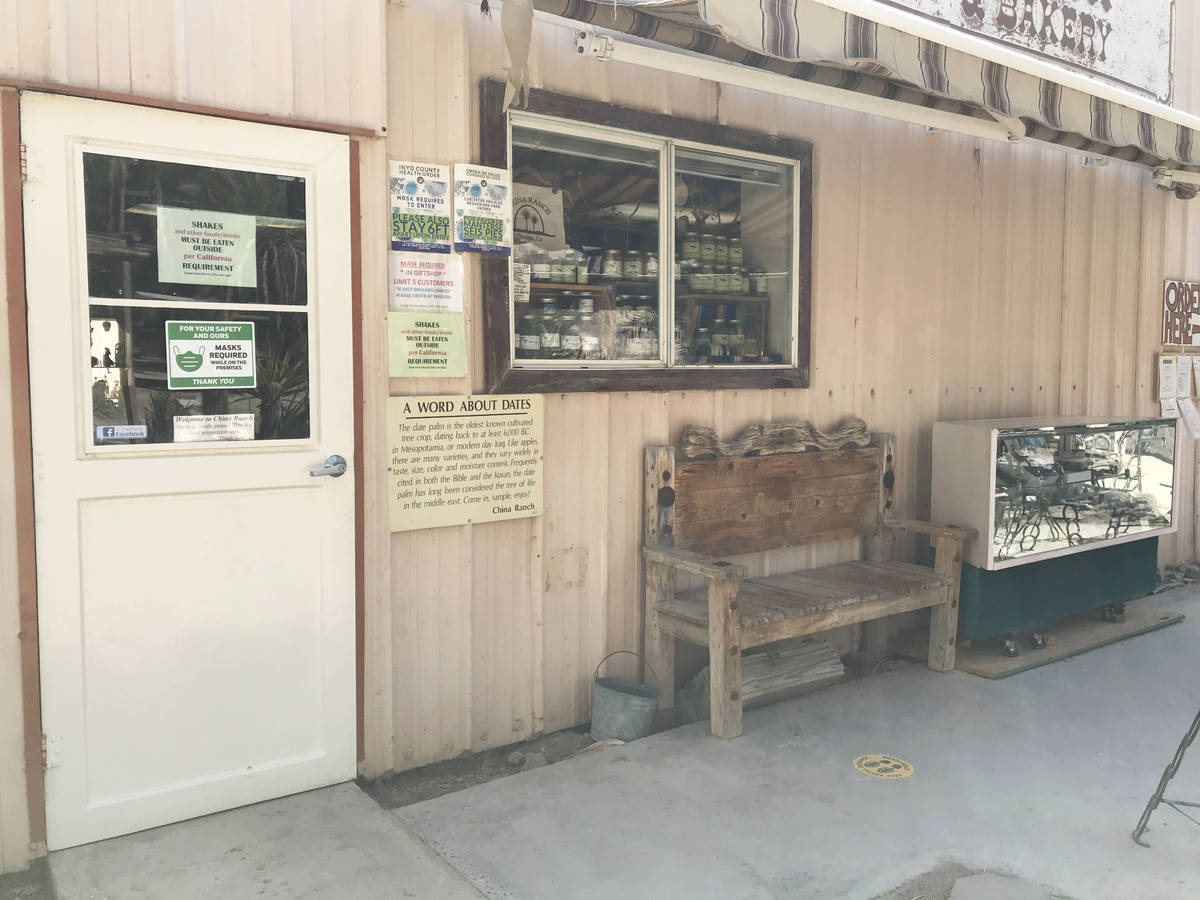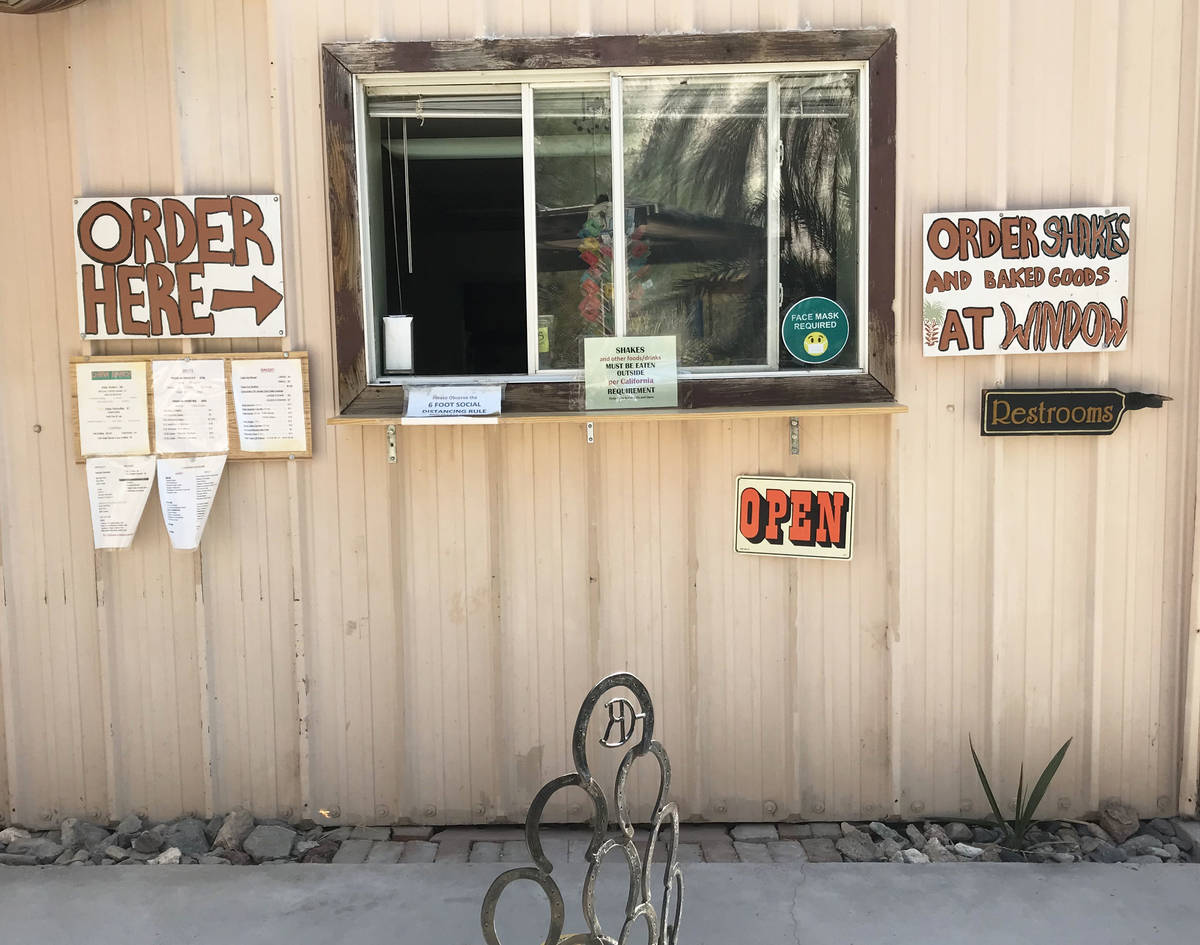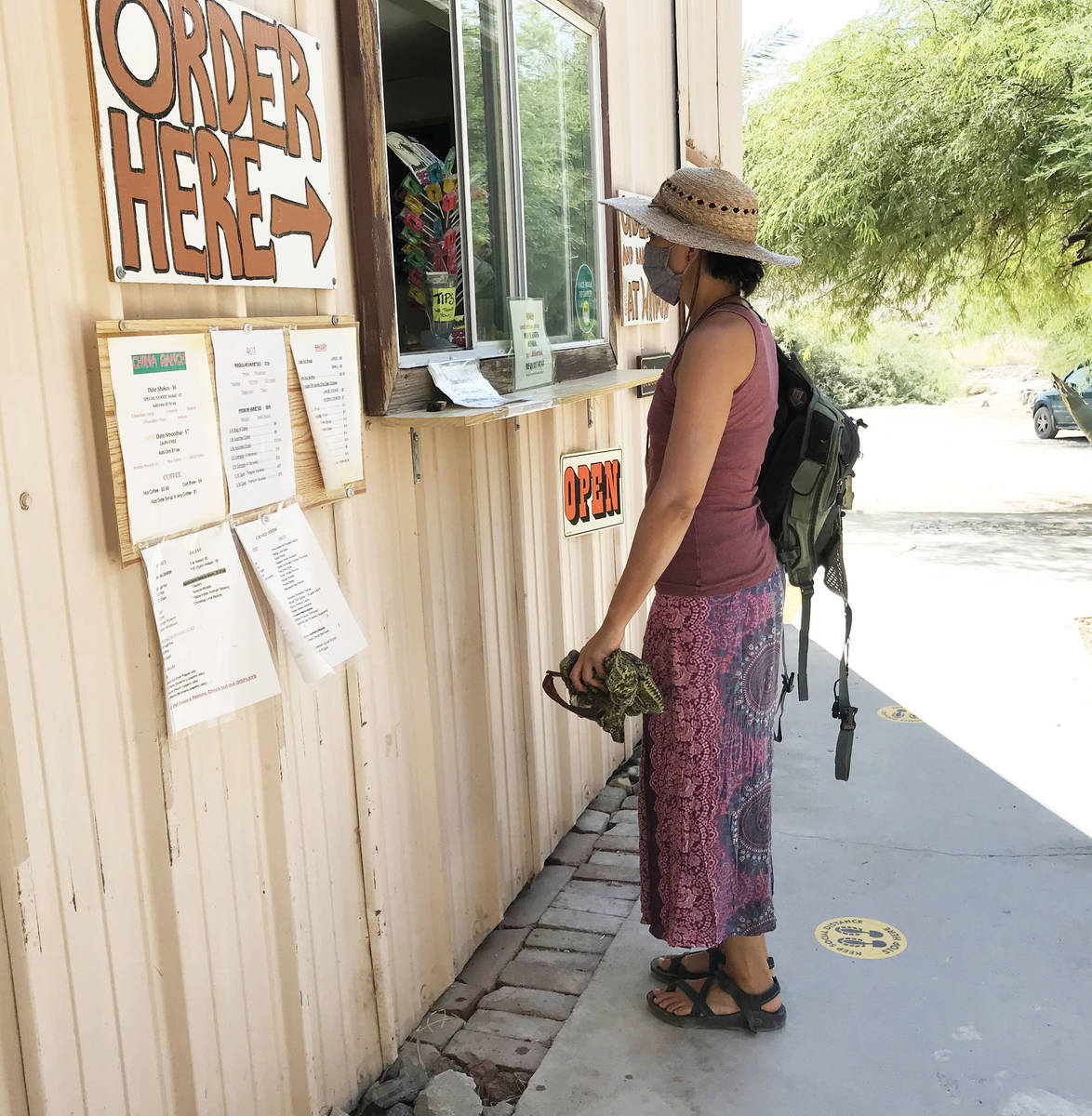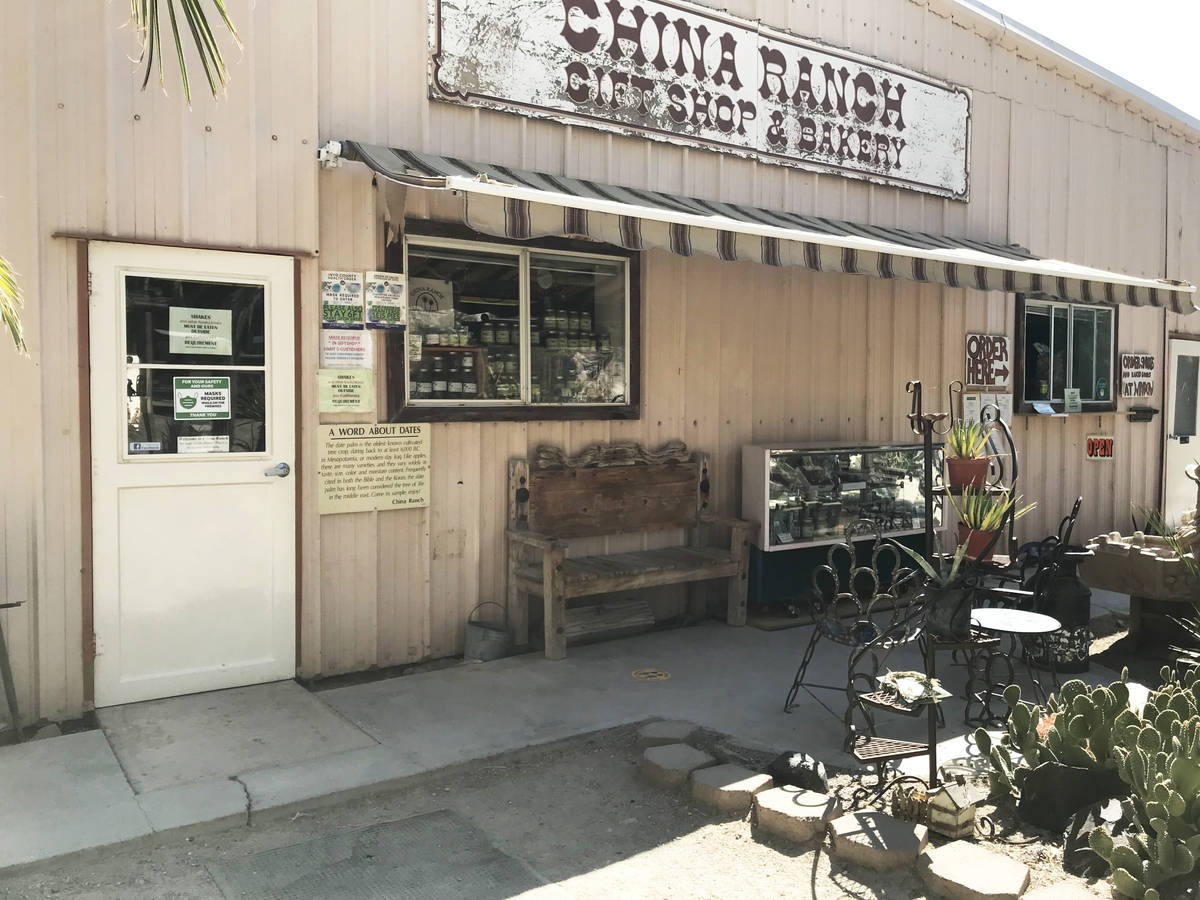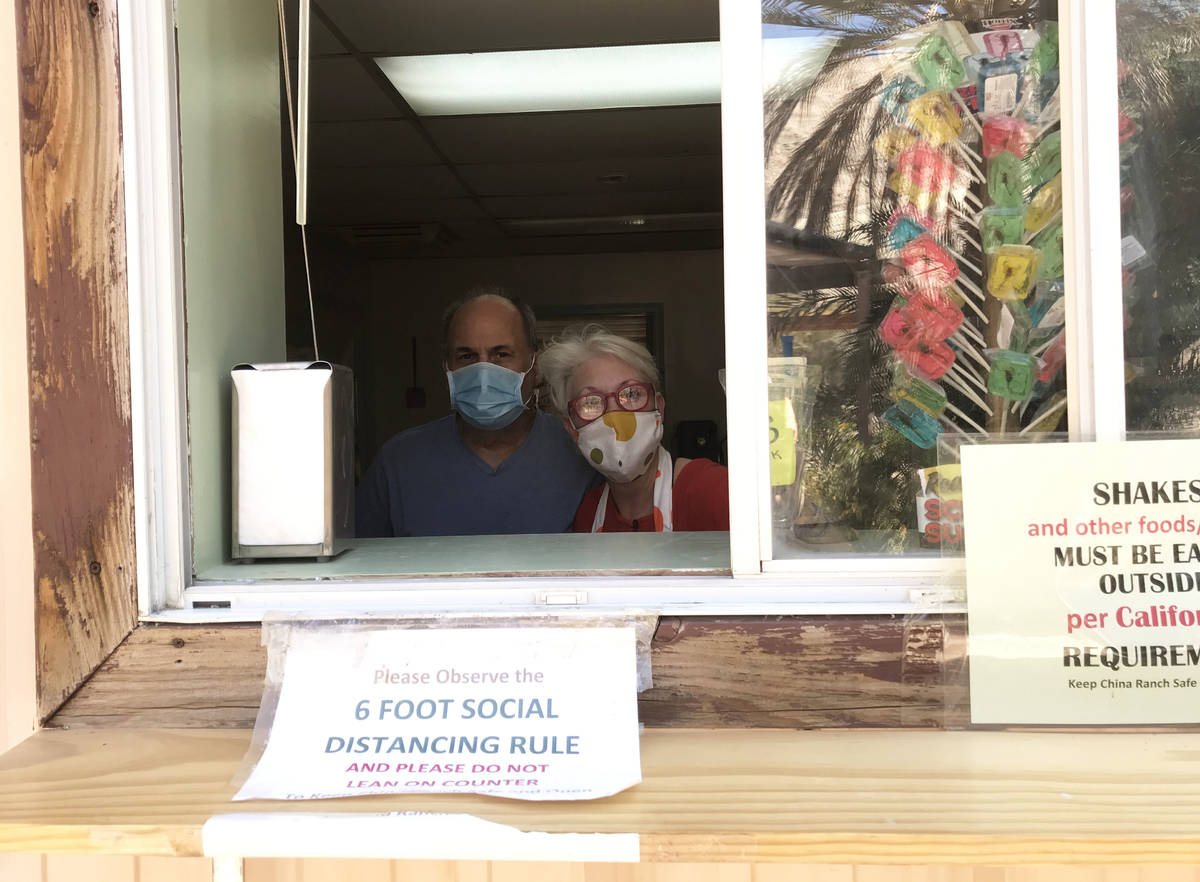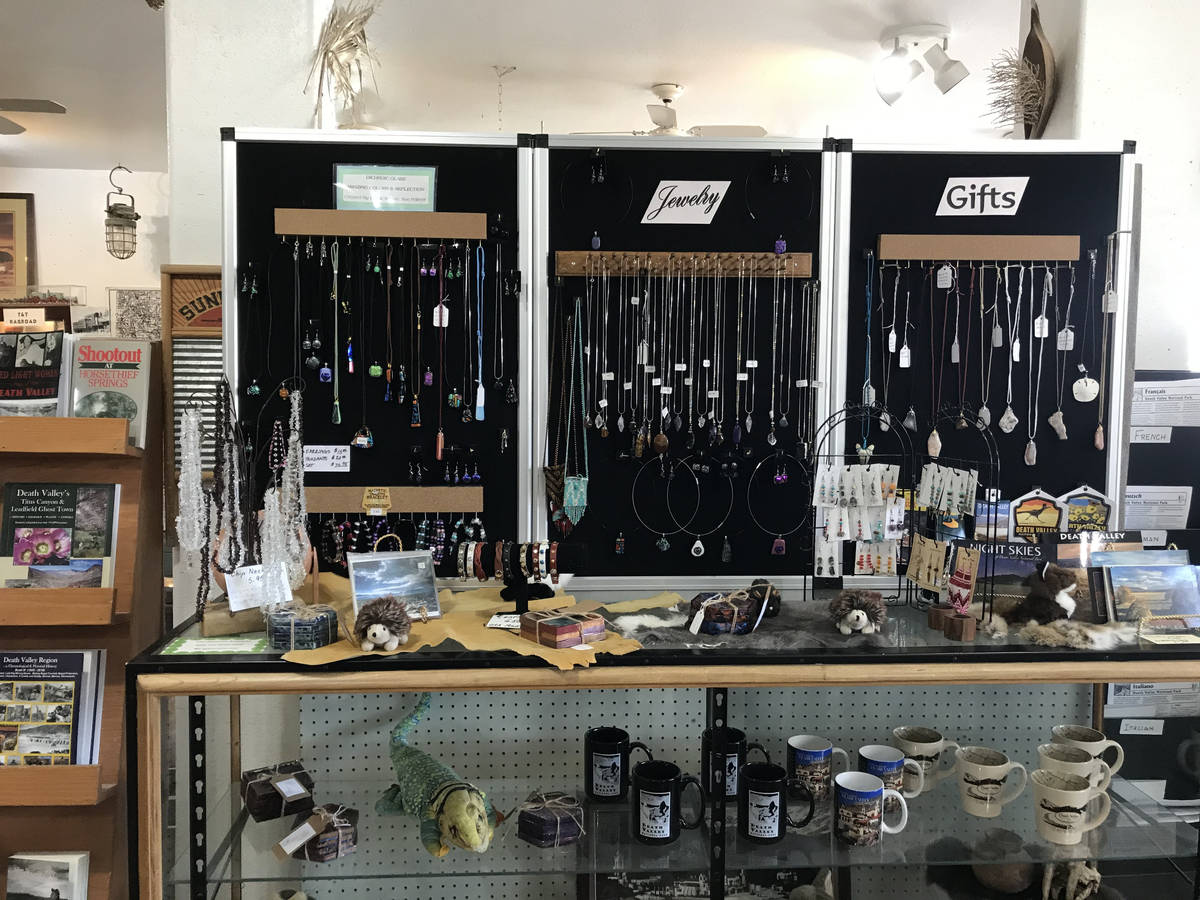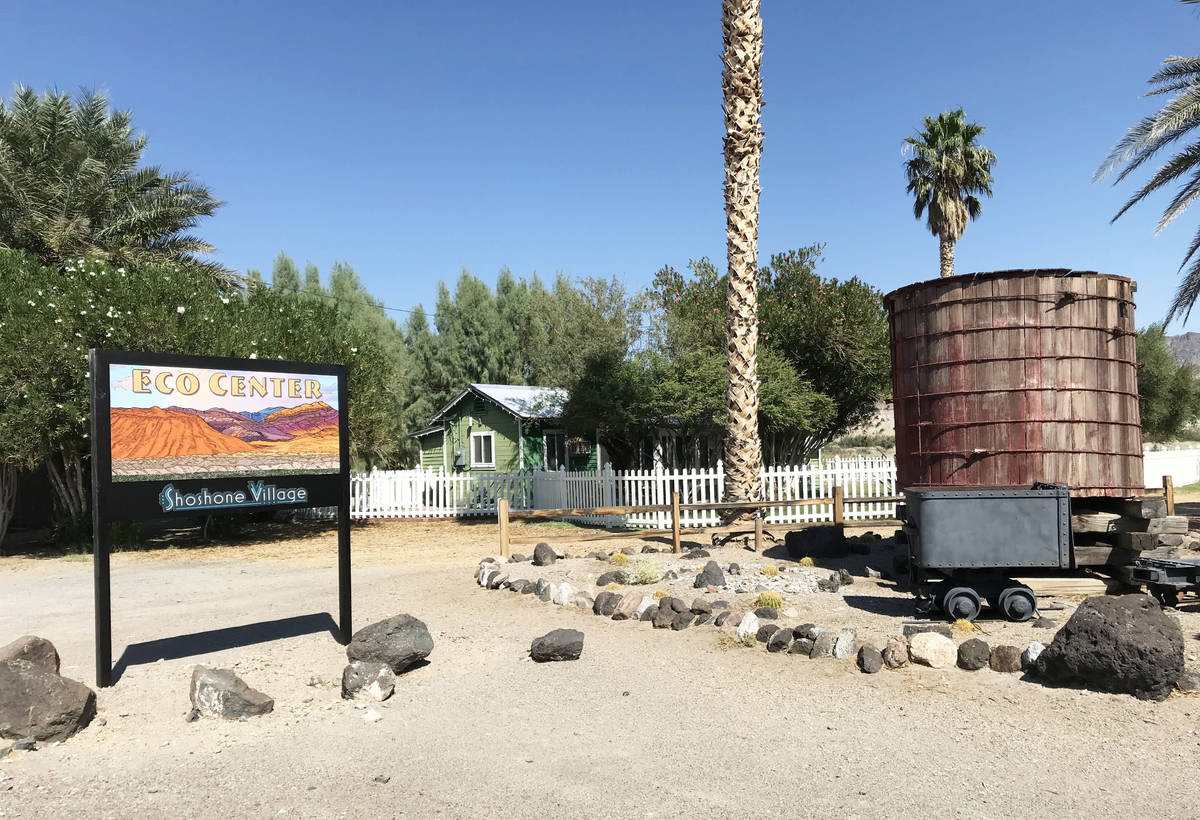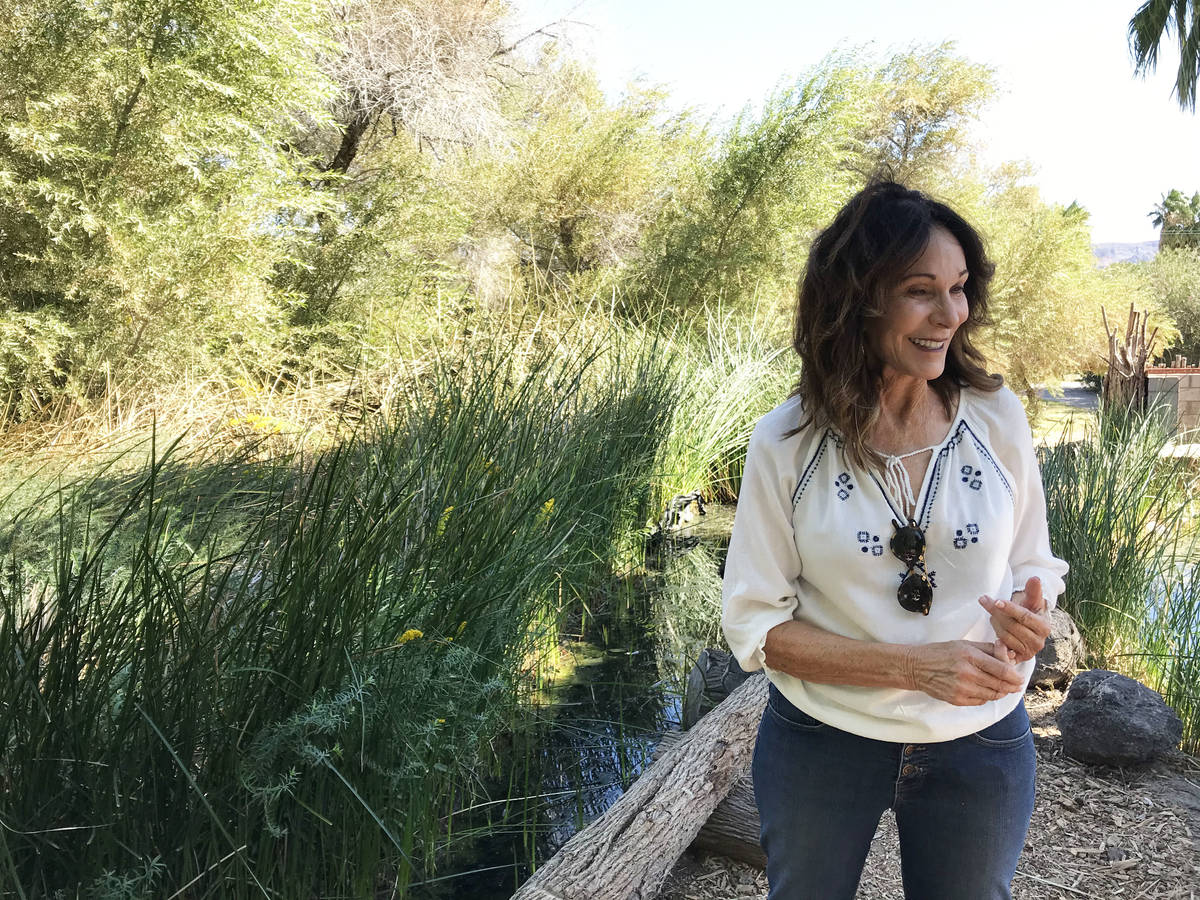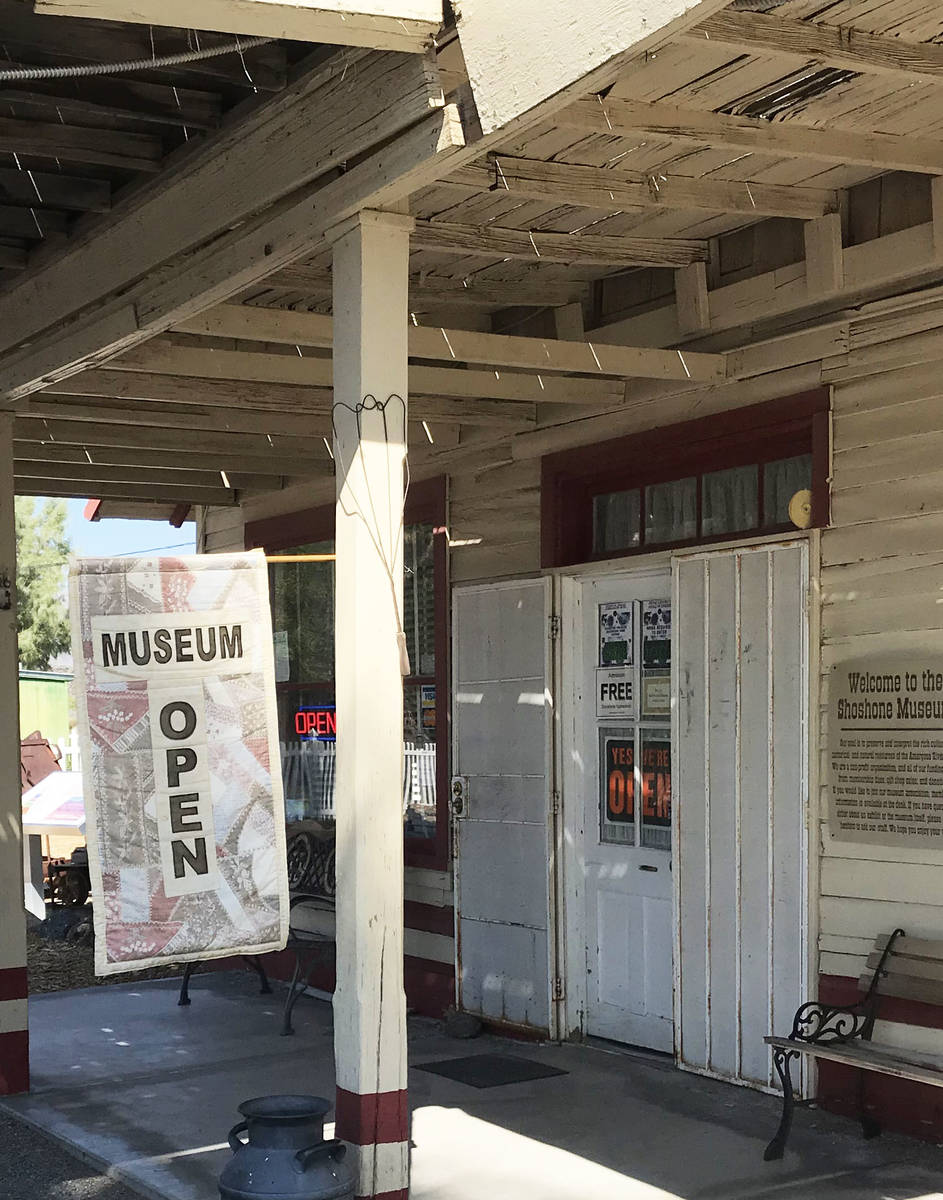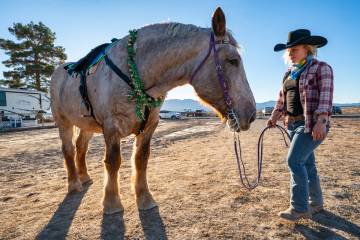Southeast Inyo County’s venerable landmark businesses still standing strong
Adaptability, commitment and a little help from their friends are keeping Southeast Inyo County’s three oldest and best loved tourist destinations in business despite the ups and downs of a pandemic economy.
From Death Valley Junction, where the Amargosa Opera House, Hotel and Café have been shuttered since the state-mandated shutdowns in March while staff fundraised behind the scenes, to Shoshone where an improvised outdoor café still served guests on the hottest day in a hundred years, to China Ranch in Tecopa, where the Brown family rethought their floor plan and sold their famous date bread through a window, flexibility is the name of the game.
Out in Death Valley Junction, Bobbi Fabian, manager of the Amargosa Opera House, Hotel and Café, is touching up the paint around the murals in the hotel’s historic lobby and bringing in a cleaning crew to dust out the rooms that have been vacant for the past seven months. The hotel is expected to open around the third week of October, Fabian said, in time for the cool weather season and in hopes of an uptick in domestic travel.
California state guidelines would have allowed them to reopen the hotel earlier, Fabian said, but with the loss of their international clientele in the summer months, the cost/revenue ratio didn’t make sense. They’d already lost out on their busiest time of year and were unable to qualify for many of the pandemic economic assistance programs because of their unique nonprofit situation. Realizing that for them the closures would likely last some time, the Amargosa Opera House, Inc. governing board created a Go Fund Me campaign in early May. With expenditures for maintaining the historic structures totaling $5-6K a month and income totaling zero, it became clear that the preservation of Marta Becket’s legacy would depend on the generosity of friends and fans.
And they didn’t disappoint. So far the campaign has raised over $30,000 of the $48,000 goal and Fabian said she is hopeful the hotel will attract enough visitors to offset expenses and perhaps even help pay the monthly bills. Fabian said she is looking forward to having guests in the hotel again, but Marta Becket’s Amargosa Opera House remains closed due to the difficulties involved in achieving compliance with social distancing regulations. This will be the first time the famous stage has missed a performance season since 1968.
Neither the Opera House nor the Amargosa Café are likely to reopen until the fall of 2021, said Fred Conboy, president of Amargosa Opera House, Inc. But work is ongoing behind the scenes to secure funding, continue cataloging Marta Becket’s extraordinary collection of art and artifacts, and, as always, to continue infrastructure repairs. AOH was able to secure a sizable grant for a septic upgrade this year through California’s Proposition 1 and participation in the Inyo-Mono Integrated Regional Water Management Program, said Fabian. This will help alleviate some of the constant plumbing worries.
Meanwhile, Fabian is rearranging the furniture, making up guest packets of hand sanitizer and masks and working on rehiring and training staff for the upcoming season. There is also a new USGS seismic monitor in Death Valley Junction, and for patrons who can’t visit in person, there is a new weather monitoring station where they can at least keep up to date on the local weather at https://www.wunderground.com/weather/us/ca/death-valley-junction.
To help keep the Amargosa Opera House in good repair and ready to reopen when restrictions allow, friends and fans can find the fundraiser at https://bit.ly/36JQISH
In Shoshone, Susan Sorrells, whose family has owned the tiny town since its founding in 1910, has been riding the pandemic roller coaster in the front seat, overseeing operations for a store, restaurant, motel, and the new Shoshone Village Eco Center as well as the local nonprofit museum.
Back in March, everything but the store came to a screeching halt. “It was really traumatic to try and gear down at our busiest time of year,” she said. The Charles Brown General Store remained open as an essential business, selling groceries, able to provide some sustenance to local residents when shelves in Pahrump were bare. “We started making breakfast burritos and healthy snacks that people could take with them.”
Eventually, the Shoshone Inn and the Crowbar Cafe reopened. As of Oct. 6, Inyo County was downgraded from substantial to moderate Covid levels under California guidelines, meaning restaurants can now seat fifty percent of capacity indoors. But through the brutal summer, in which Death Valley hit a hundred-year high temperature record of 130 degrees in August, it was outdoor seating only. At the Crowbar, “we put up a shade tent and bought some outdoor coolers,” Sorrells said, “and people loved it.” During the shutdown, they also revamped the menu to include some more healthy options.
The shutdown, Sorrells said, also provided an opportunity to do a “huge deep-cleaning, remodel and upgrade. We are also trying to use this time to be proactive, to rethink our path.” Some projects were put on hold. “We stopped all capital investment and went bare bones,” but some remodeling was already underway and went ahead as planned. That included the opening of her grandparents’ historic home as the new Shoshone Village Eco Center, a hub for local eco-friendly tourism. “We tried to make the most out of a little and be positive.”
Sorrells has a particular passion for the land where she grew up and for protecting its plants and animals. She is an advocate and active participant in wildlife habitat restoration. For the past several years she has worked “to incorporate more nature into the community. The move toward ecotourism has been an amazing driver for us. It’s the same business but with a bigger focus on nature and community, a subtle shift to a natural habitat where people feel welcome because people are part of the solution,” she said. “It’s the diversity of life.”
The last business in Shoshone to reopen on Oct. 1 was the Shoshone Museum, an independent nonprofit housed in an old general store building brought down from the mining camp of Greenwater in the town’s early days. Although the museum was closed all through the summer, Sorrells said the staff met for volunteer work days once a week to clean, dust and reorganize so they could come back strong. They also mounted a fundraising campaign to help pay the ongoing bills and raised about $12,000 through letters to the museum membership and an online appeal, Sorrells said.
To contribute, the Shoshone Museum Association welcomes donations in person or mailed by check to P. O. Box 38, Shoshone, CA, 92384, said Toni Kizzia, who helps organize the museum’s fundraising efforts.
For the owners and managers of these time-honored institutions, perhaps the hardest part has been taking care of their employees. Having to lay off some workers during the shutdown was painful, Sorrells said. “We’re like family out here. We had 30 employees and now we have 18. It was really hard.”
Taking advantage of California’s Paychek Protection Plan loans, both Sorrells and Travis Brown, manager of the China Ranch Date Farm in Tecopa, were able to keep on a slimmed-down staff. Now the responsibility of protecting that staff weighs heavily on them.
“I worry about it every day, it’s the last thing I think about every night before I go to sleep,” said Brown, who currently has employees working the ranch’s gift shop and in the field harvesting the first round of dates for the fall crop. Cooler weather and a relaxing of the pandemic restrictions means more visitors, which is good, he said, but brings worries about the spread of the virus, especially for his employees. “We’re really careful, masks are required and people are pretty good about it,” he said.
Brown grew up on China Ranch, a remote desert oasis where nearly a hundred years ago his great-great-aunt planted the first trees that would someday form the heart of this thriving date farm. He and his partner Lenae Day have been managing the day-to-day operations for a couple of years now. When the shutdown happened, Brown said, they all had to think on their feet. “Luckily, we had a window in the kitchen.”
Designated as a farm stand, China Ranch was allowed to remain open, but had to adapt to new and stringent safety protocols. The staff began brainstorming and moving things around. Within two days, Brown said, they had closed the shop, converted the kitchen window into a sales counter, set up an outdoor display case showing all the items customers could order through the window and just kept on baking bread, making milkshakes and selling their famous dates.
The loss of international tourists was a blow to China Ranch as well, but Brown said they have seen an increase in local visitors and people from Las Vegas “just wanting to get out of the house. They seemed really grateful we were here.”
The gift shop has reopened and customers can go inside and browse now, but visitors can also stay outside and still order through the window, Brown said. The menu now includes a dairy-free date smoothie and some new items, including date syrup, granola and trail mix made in the China Ranch kitchen.
Of all they’ve been through lately, “the weirdest part is how political the pandemic has become,” Brown said. “That makes it hard for small businesses because we really care. I just want everyone to be safe when they come down here.”
Death Valley Junction, Shoshone and China Ranch sometimes seem other-worldly in their quiet wildness, with hiking trails that can lead a person far enough away from civilization to be able to forget it exists, at least for a little while. The desert is a good place to escape from the stresses of the pandemic or just to recharge from everyday life. “Nature is healing,” said Sorrells, “we all need that.”
But for the people stewarding these venerable sanctuaries, there is a burden of responsibility to see that no one comes to harm on their watch. Remote as they are, “we’re very much a part of the world, we’re not a separate entity,” Brown said. “The rules still apply.”
Robin Flinchum is a freelance writer and editor living in Tecopa, California.
When You Go
- The Amargosa Hotel at California Highway 127 and Stateline Rd., Death Valley Junction, California, can be reached at 760-852-4441. The front desk will be staffed from 8 a.m. to 8 p.m. when the hotel reopens. You can find them on Facebook at Marta Becket's Amargosa Opera House or visit amargosaoperahouse.org
- The China Ranch Date Farm on China Ranch Rd. in Tecopa, California, can be reached at 760-852-4415. The gift shop is open daily from 9 a.m. to 5 p.m. Check them out on Facebook or visit chinaranch.com
- Shoshone Village can be found at Highway 127, just to the right of California State Highway 178 and 127 junction from Pahrump, in Shoshone, California, and can be reached at 760-852-4224. Various businesses in town have different hours of operation. Check them out on Facebook or visit shoshonevillage.com
- The Shoshone Museum Association at 118 Highway 127 in Shoshone California is open daily from 9 a.m. to 3 p.m. and can be reached at 760-852-4524. Check them out on Facebook.
To keep these landmark businesses open and in compliance with Inyo County regulations, be prepared to:
• Wear a mask at all times when in contact with the public, except when food is on the table in front of you at a restaurant
• Don't visit in large numbers unless you make prior arrangements with the management
• Keep 6' of distance between yourself (or your group) and others
• Sit or wait outside if asked
• Understand that all business, especially restaurants, are currently only allowed to operate indoors at half of their usual capacity


